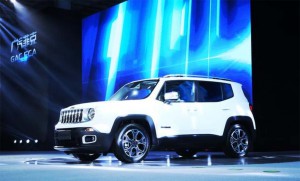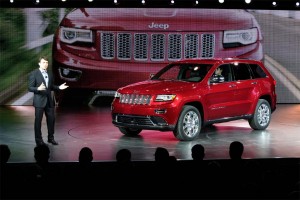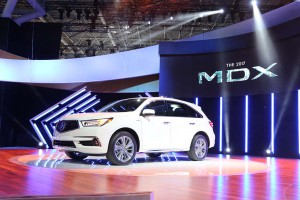Today’s battery-based vehicles tend to be small sedans, coupes and hatchbacks. But that’s beginning to change with high-end products like the Tesla Model S and, more recently, the Model X.
Tesla will soon have some challengers in the battery-electric SUV market including Audi, set to debut an all-electric ute in 2018. And Jeep is getting ready to weigh in, as well, according to brand boss Michael Manley.
While Fiat Chrysler’s SUV division isn’t ready to release specific plans, Manley told TheDetroitBureau.com that new battery-based products are “under active development,” and other company sources indicate they aren’t very far from launch.
The move may come as a surprise to those who think of electric propulsion as primarily something used on slow and wimpy products. The fact is that battery technology actually has a number of advantages that are suitable for off-road use, said Manley, starting with lots of low-end torque.
“I feel really confident about the abilities it brings to Jeep,” he said during a conversation at the Fiat Chrysler Automobiles proving grounds in Chelsea, Michigan.
That low-end torque is more useful than lots of horsepower when slowly grinding over a rough trail, explained Manley. And depending upon the design of the powertrain, electric motors can do a very effective job of shifting torque to just the wheels that need it.
(Jeep heading for another annual sales record. Click Here for more.)
Acura is demonstrating that with the electric version of its Super-Handling All-Wheel-Drive system. On the Acura NSX, two motors up front provide nimble torque vectoring to help the sports car steer through tight corners. The powertrain layout is reversed on the Acura MDX, with separate motors on each wheel helping improve traction on slick pavement and trails.
Jeep’s embrace of electrification reflects the rapid evolution of battery powertrains. “It has developed dramatically, even in just the last two years,” said Manley, and will continue to evolve at a rapid pace.
Fiat Chrysler has been slow to adopt battery powertrain technology, launching its first pure EV, a version of the Fiat 500, only a couple years ago. It is now rolling out its first plug-in hybrid, a version of the all-new Chrysler Pacifica minivan.
(Fiat Chrysler sending out fix for recalled eShifters on Jeeps, sedans. For more, Click Here.)
Reading between the lines of Manley’s comments, it appears that Jeep may eventually offer several different types of battery-based technology, including conventional hybrids, plug-ins and pure battery-electric models.
The same is true for the broader FCA family of products. And that reflects the reality of a rapidly changing regulatory environment.
“We will have to incorporate electrification” if Jeep and its sibling brands expect to continue selling in a number of key markets, notably China and Europe.
Desperate to solve the country’s endemic air pollution problems, Chinese regulators have been putting a growing emphasis on electric propulsion, and the rules are becoming quite “stringent,” said Manley, who also heads Asian region operations for FCA. “It will be impossible to achieve our sales targets in China,” he added, “without a sizable segment of our products being (so-called) new energy vehicles.”
In Europe, meanwhile, there is a growing push for electrification as diesel power begins to lose favor. German regulators are pushing for plans that would require all new vehicles sold there by 2020 to be zero-emission models.
With those two markets moving towards battery power, it only makes sense to share new electric propulsion systems in other parts of the world, including the U.S., where plug-ins and BEVs will help meet the tough 54.5 mpg corporate average fuel economy standard going into effect in 2025, explained Manley.
At the moment, battery-based vehicles make up only a tiny share of the global fleet, but Manley said he expects such models to become “larger percentage of the mix over the next five to 10 years…definitely in the double-digits and maybe 15% to 20%.”
(Death of Star Trek actor raises concern about Jeep shifter. Click Here for the story.)



